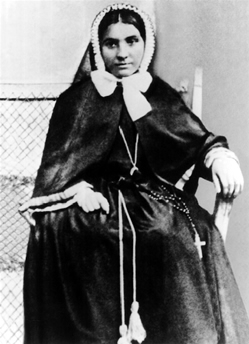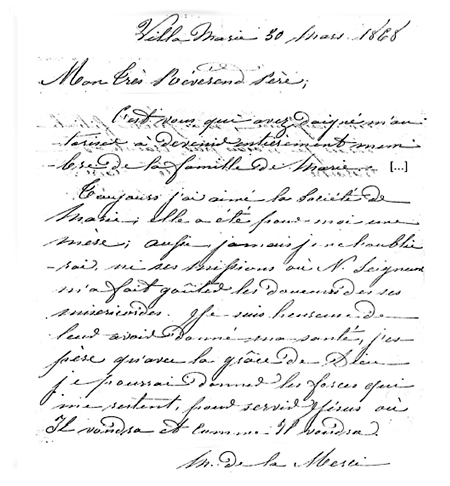06/11/2025
Needs of the Church, the Congregation and the world
06/11/2025
Prayer Intentions of the Pope
06/11/2025
Needs of the Church, the Congregation and the world
06/11/2025
Prayer Intentions of the Pope
04/09/2025
Needs of the Church, the Congregation and the world
04/09/2025
Needs of the Church, the Congregation and the world
04/09/2025
Prayer Intentions of the Pope






Our pioneers | The Vocation of the Pioneers
 Sr Marie de la Merci emerges from her letters as a very gifted young woman, a natural leader, well-educated, with a pleasing personality. The eldest of three girls in the family, she left for Oceania at 21 years of age in the third departure group in October 1858. She was a member of the TOM in La Seyne and had taught in the Marist Fathers’ college there before leaving France.
Sr Marie de la Merci emerges from her letters as a very gifted young woman, a natural leader, well-educated, with a pleasing personality. The eldest of three girls in the family, she left for Oceania at 21 years of age in the third departure group in October 1858. She was a member of the TOM in La Seyne and had taught in the Marist Fathers’ college there before leaving France.
Just as she was to board the ship in Bordeaux she received news of her mother’s death which naturally came as a terrible shock. However, she decided to go on rather than return to her family. “After having reflected on everything, I resolved to persevere and to follow the route God has traced out for me” (Merci-Yardin, 09.03.1859, Letter 1, §4). At that time, it became clear to her that the Society of Mary was her family, a conviction that grew stronger as the years went on as she often expresses joy in her letters in belonging to the “family of Mary”.
Her giftedness was obvious to all in Futuna where she was missioned. She seems to have acquired the language without too much difficulty, was very successful as a teacher and very popular with her pupils whom she loved. As a result, she was given responsibility very young. Bishop Bataillon, who noted her gifts, even wanted to make her foundress of a diocesan congregation he would begin in Samoa for young women from the islands. In his view it was too expensive to continue having European Sisters (cf. Dezest-Favre, Dec. 1863, OPS II, 324). Her vow of obedience, taken for 5 years, had expired; the bishop asked her to renew it to him. She had the courage to refuse as she knew her vocation was not to a particular mission, nor to a particular bishop (cf. Merci-Favre, 15.11.1863, Letter 16, §14, OPS II, 321). However, she paid a price for her refusal.
Having come to Sydney in 1865 for health reasons, she welcomed the Sisters of Our Lady of the Missions in 1867 and made profession in the congregation in February 1868. However, after the difficulties that arose and the return of the sisters to France, she withdrew in 1869, preferring to be once again a simple Tertiary. She continued to be at the service of the Marist Fathers in Villa Maria, with the help of Sara and Silenia, two Futunians, whom she formed at the same time for religious life.
Unfortunately about 1875 her relations with Fr Joly, the superior, became strained. His “incomprehensible conduct,” as she describes it, caused her much pain. She grew increasingly depressed at the impossibility of her situation in Villa Maria. Besides, she was very sick. Doctors advised her to return to France which she did in 1881. Broken in health and without any immediate family, nor any financial resources she looked for work. Finally, she accepted an offer of marriage from Vital Seymat, widower and landowner, but as she shares it was notwithout much heartache.
At this distance in time, we can’t help regretting the way Marie de la Merci was treated in Sydney. She who had so much potential was deprived of community and mission for so long there, despite the fact she had expressed many times her desire to return to the missions in the Islands. Her departure from the congregation is a sad page in our history.

It is you who deigned to authorise me to become a full member of the family of Mary… I have always loved the Society of Mary; it has been a mother to me, so I shall never forget her, nor her missions where Our Lord has allowed me to taste the sweetness of his mercies. I am happy to have given them my health; and I hope with God’s grace I will be able to give all the strength that remains to me to serve Jesus where and as He wills (Merci-Favre, 30.03.1868, OPS III, 496).